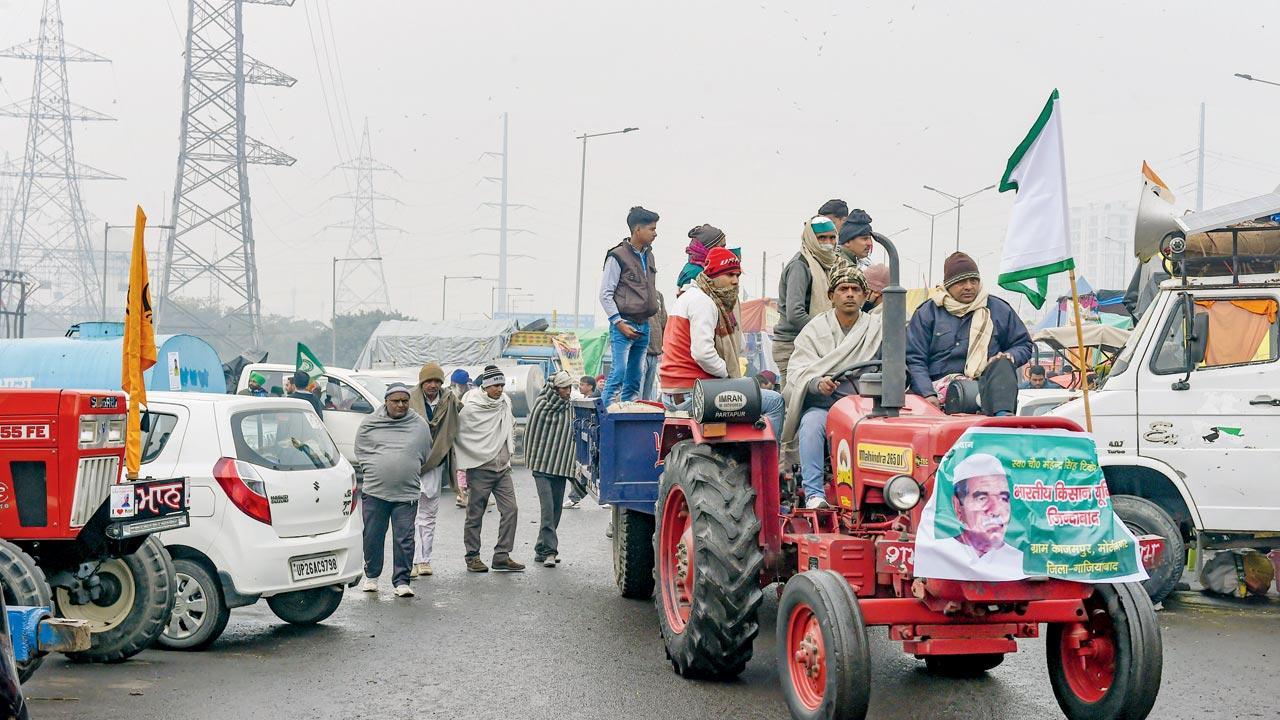With neither the offer to amend farm laws nor the celebrating of Sikh Gurus' martyrdom appearing to placate farmers, the Prime Minister faces a dilemma that could make him appear either unfair or weak.

Protesting farmers seen at Ghazipur border in New Delhi on Saturday. Pic/PTI
Prime Minister Narendra Modi is said to possess a will that does not bend under the pressure or pleas of the people. His will is credited with having driven his government to sweep aside acute public discomfort to implement demonetisation, the Goods and Services Tax, and COVID-induced national lockdown on just four hours of notice. His will is also cited to explain his risky decisions of reading down Article 370, launching a retaliatory airstrike against Pakistan, and enacting the Citizenship Amendment Act.
ADVERTISEMENT
The supporters of Modi say the indomitable nature of his will springs from his certitude that his policies will create a better India. They, in the manner of a character in novelist Margaret Atwood's The Handmaid's Tale, would argue, "Better never means better for everyone…It always means worse, for some." They say Modi is justified to not let the misery of some rescind his decisions taken for building a new India.
The opponents of Modi perceive his will as an extension of his arrogance, which has grown with stunning electoral successes. This has made him believe he is infallible, and short-circuit democratic processes and stamp out dissidence. For them, his will is the will of a dictator whose flawed policies have a debilitating impact on many, not some. Their opposition has been muted because they realise the futility of pressuring Modi into reversing his policies.
The ongoing farmer protest outside Delhi has put the indomitability of Modi's will on test. There are reasons why state power cannot be deployed to crush the farmer protest dominated by the Sikhs of Punjab. For one, a disaffected Punjab will provide Pakistan a front other than Kashmir to destabilise India. For another, an alienated Sikh community could strain social relations in Punjab, where Hindus are 39 per cent of the population. Nor would Modi's indifference to the protest sap the energy of farmers, who can replenish their resources from their home bases of Punjab and Haryana that are contiguous to Delhi.
Initially, the Bharatiya Janata Party sought to tag protesting farmers as Khalistanis and Naxalites to demoralise them. But the ruling party backtracked as its tactic did not diminish the support for the protest in even the Hindu-dominated Haryana. Wary of rural discontent spreading, the government opened negotiations with the farmer unions, which insist the three new farm laws must be repealed before they call off their stir.
This concession will signify Modi bending before the popular will. It is to preclude this possibility that his government has offered to amend the laws to the satisfaction of the farmer unions. Amendments can be dressed as a compromise hammered out between the farmers and the government – and would not shatter the popular perception of Modi's will. The BJP depends on this perception to subliminally underscore to those who have suffered from Modi's economic mismanagement the sheer futility of rising in protest against him. This advantage would be squandered with the government repealing the new farm laws, for the indomitable nature of Modi's will would then be seen as a myth, emboldening the discontented to resist his policies.
Modi's other tactic of placating the Sikhs is to celebrate the martyrdom of their Gurus and their families, for protecting, as he said, India's civilisation from the "cruel misdemeanours of tyrants and tormentors." The tyrants were Muslim by faith; their place of origin was Central Asia. Modi was invoking the Hindutva precept that those who consider India as their fatherland and holy land are culturally united. He was conveying to Sikh farmers that as a paramount Hindutva leader he could not be unjust to them. They must trust his policies.
However, Modi's paeans to the Gurus also convey a coded message to the Hindus, whom Hindutva has taught to look upon the Sikhs as their fighting arm: It is the Sikhs who are unwilling to bend, not him. It is they who are responsible for undermining the essential cultural unity forged by Hindutva. Modi's imposition of religious identity on the protesters distinguishes Sikh farmers from their Hindu counterparts in the North. The latter must not desert the Hindutva fold to opt for the occupational unity of farmers. They must not forget who their real tormentors are.
No wonder, Uttar Pradesh promulgated the ordinance against 'love jihad' two days after the farmers arrived outside Delhi, on November 28. Is the recent outbreak of communal tension in Madhya Pradesh's Mandsaur district, which witnessed a stirring farmer protest in 2017, a coincidence? Indeed, the indomitability of Modi's will is linked to Hindutva's ascendancy; its decline will shift the focus to economic issues.
Sociologist Paramjit Singh Judge says research worldwide shows that the two attributes of leaders appreciated most are firmness and fairness. The three farm laws are widely seen as Modi's promotion of corporate conglomerates, at the expense of farmers. This has established his unfairness. The government's negotiations with the farmer unions today, January 4, will test the firmness of his will. Modi's dilemma is that his firmness will make him appear unfair. His wish to appear fair would require him to retreat and expose as mythical the indomitability of his will.
The writer is a senior journalist
Send your feedback to [email protected]
The views expressed in this column are the individual's and don't represent those of the paper
 Subscribe today by clicking the link and stay updated with the latest news!" Click here!
Subscribe today by clicking the link and stay updated with the latest news!" Click here!






